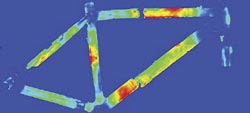
Posted to News on 2nd Oct 2011, 15:04
Pulse thermography inspection of carbon fibre composites
Flir thermal imaging cameras are being used to check for invisible defects in carbon-fibre reinforced bicycle frames by means of a pulse thermography technique.

Modern bicycle frames are made of carbon fibre-reinforced plastic (CFRP), which offers an exceptional combination of low weight, high strength and stiffness. But the way these frames behave in case of failure is fundamentally different from metal frames. Instead of bending or cracking, carbon fibre-reinforced plastics break, exposing riders to dangerous situations; failures can lead to injury or even death.
With pulse thermography quality tests using Flir thermal imaging cameras, defects in the carbon fibre-reinforced composites can be detected before such failures occur. One company that provides this service is the Carl Messtechnik, based in Dinslaken, Germany.
Volker Carl, the owner of the company and an expert in pulse thermography, states: "Usually bikes with carbon fibre-based frames do not come cheap, so not only are these tests important for driver safety, they also serve to protect your assets."
Causes of defects
Carl says his customers have many different reasons for coming to him for these tests: "Some of them might have had a crash with their bike and want to make sure that this accident has not caused invisible defects. Other clients have bought a second-hand bike and, although it looks perfect on the surface, they want to make sure that it contains no hidden flaws."
These flaws in the bike frame can be caused by more than accidents, as Carl explains: "Carbon-based frames can be surprisingly vulnerable to specific types of stress. A bike might fall over and hit the edge of the curb, for instance. Even if you tighten the roof-rack clamp or derailleur clamp too tightly when you are preparing your bike for transport, this can cause invisible cracks. On the surface, everything might still look fine, but in reality the bike is damaged and it will only last a couple of days before it breaks."
Using a bike with such invisible damage is potentially dangerous. "Imagine you are descending from a mountain at high speed and suddenly in a bend in the road your bike breaks. That really is a very dangerous situation. Not only can such accidents be prevented by detecting defects beforehand, in most cases it is also possible to repair these defects. Although the repair process is quite complex, it can often result in a bike that is even stronger than the original design."
Pulse thermography

The instrument used by Carl is the Flir SC7000 thermal imaging camera. The cooled indium antimonide (InSb) detector is extremely sensitive (
Currently Carl is also working on a new setup with a Flir SC645 thermal imaging camera. "The Flir SC645 is slightly less sensitive, but the difference in price and in maintenance cost with the SC7000 will allow me to charge lower fees for the quality tests using the Flir SC645 thermal imaging camera."
This new setup will open the door for a new type of customer, Carl hopes. "Currently my customers are mostly professionals and semi-professionals that use their bikes very often. They really need to be sure that the bike is absolutely safe, so I expect that this type of customer will still prefer the more accurate tests using the Flir SC7000 thermal imaging camera. But I think that hobbyists that currently refrain from this type of test will be attracted to the quality tests using the Flir SC645 because of the lower fees."
Uncooled camera benefits
The Flir SC645 thermal imaging camera has an uncooled microbolometer detector that produces thermal images at a resolution of 640 × 480 pixels. With its thermal sensitivity of
Carl is very happy with Flir's product range, saying: "In my experience there is no thermal imaging camera supplier in the world that has such an extensive range of different types of thermal imaging cameras. From the affordable SC-series to the extremely advanced SC7000 thermal imaging cameras, Flir has exactly the camera to fit anyone's needs."
Follow the links for more information about the Flir SC7000 and Flir SC645 thermal imaging cameras.
Want the latest machine building news straight to your inbox? Become a MachineBuilding member for free today >>

















